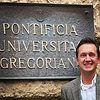Media and Links
"In Fort Morgan, local markets connect the Somali Community"
by Priya Shahi, Rocky Mountain PBS, 8 December 2025
AskHistorians.com online forum where readers asked live questions about my new book,
Building the African Nation, pan-Africanism, and African Identity, August 2025
"From Denver to Dar es Salaam: Exploring African History with Ethan Sanders, PhD" by Dave Francois, Regis Magazine Fall/Winter 2024
"Prof. Gives the Vatican a Lesson in African History, Politics, Spirituality" by Karen Auge, Regis Life, February 2024
Pontifical Gregorian University, Rome, 24 November 2023 (YouTube: 1:32:34-2:04:07)
* This event was covered by L'Osservatore Romano, Vatican News, The Gregoriana, and Matters India
"Why is the Middle East called the Middle East?" Regis 60-Second Lectures, 2021
Friends' Book Recommendations
One of the best parts of being an academic is having awesome friends that write. In order to encourage them and promote their great work, I from time to time like to plug my friends' and colleagues' books.

BOOK PLUG, SUMMER 2025 EDITION: Derek Peterson’s book A Popular History of Idi Amin’s Uganda (Yale) tells the story of Africa’s most notorious dictator in a novel way, by portraying how his regime was actually founded on popular appeal, and how he created a compelling myth for which many in Uganda were willing to fight. It is chalked full of insights of 1970s Uganda built on the new research done by teams of scholars Derek has coordinated over the last 15 years. The book also provides insights into the infrastructures at the intersection of patriotism and demagoguery that can become so harmful and how ideals of self-sacrifice can quickly turn into unhelpful vigilantism. These insights aim to have resonance today.
Erin Nourse, Water Into Bones: Birth Rituals, Ancestors, and Religious Pluralism in Northern Madagascar (Indiana) is an ethnographical account of religious rituals in Madagascar related to childbirth which connect infants to their ancestors and establish social networks for their survival. It effortlessly blends academic writing with a narrative that is vulnerable and personal, like having a warm conversation with Erin herself. It is honest, refreshing, and raw compared to most academic titles, and can probably only be pulled off because of Erin’s own rich character, which makes her such a lovely human and educator.

FRIENDS’ BOOK PLUG, WINTER 2025 EDITION: Ian Oliver's new book The Audiences of Herodotus: Oral Performance and the Major Battle Narratives argues that sections of Herodotus’ Histories were originally performed orally to various audiences in the Hellenistic world and that these audiences influenced these sections, or epideixis, of the final text that we have today. I also learned that “the father of history” was shaped by, and contributed to, the wisdom-performance culture of the sophists and that he very much saw his work of historical narrative as related to “poetry and performance as [much as] publication and research.” A reminder to all my students that historians have always worked on the style by which they shared their arguments and interpretations.
Secondly, my grad school chum, Phil Dow, presents the story of American evangelical missionaries influencing the diplomatic relations between the US and Kenya, Congo, and Ethiopia during the Cold War. While there are lots of books about the relationships between Catholic and Mainline Missionaries and Empire, Dow importantly brings this story forward to look at the 1960s-90s with a focus on American evangelicals who defy common scholarly assumptions about the end of missions in the post-colonial period and understand the current age of populist transnationalism.
Happy Reading!
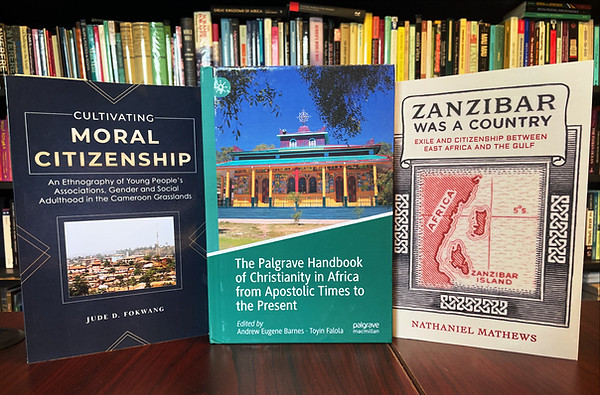
AFRICANIST FRIENDS—BOOK PLUG! My friends are putting out a lot of great work recently, check it out: Andrew Barnes, known to all in the Yale-Edinburgh Group, has edited a monumental volume on the History of Christianity in Africa that includes a long list of the best scholars looking at Christianity in Africa. Least of which is me, as I contributed a chapter on “Ethiopianism in Africa” that looks at this unique Christian prophecy and thought style starting in the Black Atlantic in the 1700s and tracing its impact in Africa in the 19th and 20th centuries where it helped to foster an African identity and the growth of pan-Africanism and independent church movements.
Jude Fokwang, my colleague wrote Cultivating Moral Citizenship, an ethnographic study of young people’s movements in Cameroon, looking at how young people have to deal with ‘waithood’ in an ever-changing post-colonial world.
Lastly, but not least this time, is Nate Matthews book Zanzibar was a Country which is a fascinating study on the lives of the Arabs of Zanzibar who were forced to flee in the wake of the 1964 Revolution. Happy reading!
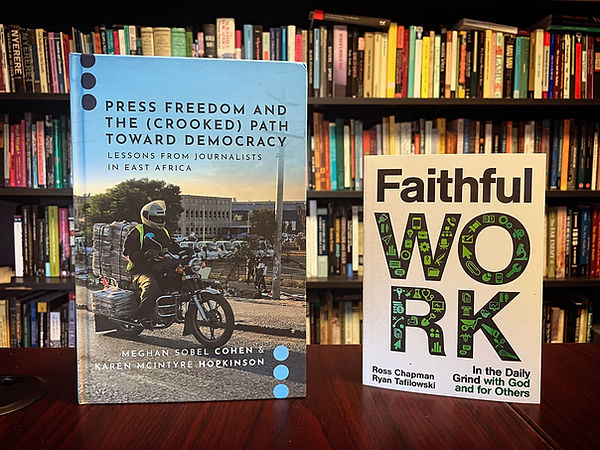
BOOK PLUG, SPRING BREAK 2024 EDITION: So my friends and colleagues are at it again. Meghan Sobel Cohen co-authored Press Freedom and the (Crooked) Path Towards Democracy: Lessons of Journalists in East Africa (Oxford University Press) that argues that to better understand the relationship between media, political change, and democratization, we must be willing to look at the historical contexts of non-Western regions as the current media models fail to understand both the nuances of the “developing” world as well as the non-linear fashion in which nations develop. A great read for thinking through issues of media and politics in contemporary East Africa.
Second, Ross Chapman recently co-authored, Faithful Work: In the Daily Grind with God and for Others (IVP) which points out that we spend 1/3 of our waking lives at work, and yet how many of us think through the ways we can use that time to serve others and serve God.
Check em out!
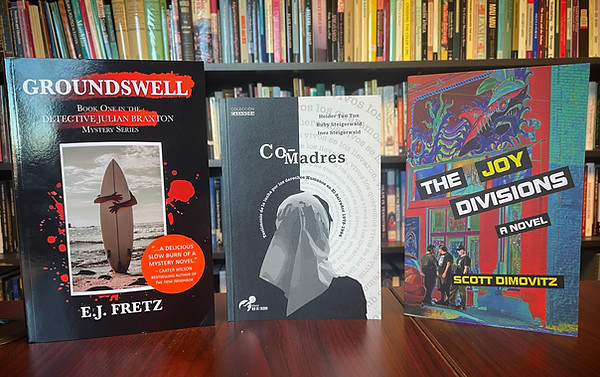
BOOK PLUG, DECEMBER 2023: My friends and colleagues on campus have published a number of books in the past month or so, and I just wanted to plug their work in case your are interested in some winter reading. My history colleague Heider Tun wrote a history focusing on the testimonies of the Co-Madres group in El Salvador, a group of women and relatives of prisoners who have been fighting government brutality since 1977 (and the subject of U2s “Mothers of Disappeared”) there were also two debut novels by Eric Fretz and Scott Dimovitz, one, Groundswell, a murder mystery among a surfing community in New Zealand, the other, The Joy Divisions, a gritty story about an early 90s rust belt town and the search for meaning in a changing world. Alyse Knorr and Kate Partridge of the English Department have each written a volume of poetry and Lara Narcisi wrote a lit crit monograph on Radical Empathy in Multicultural Women’s Fiction (waiting for the paperback of this one ) I haven’t read fiction since my sabbatical, so it may be time to switch gears here at the end of the semester.
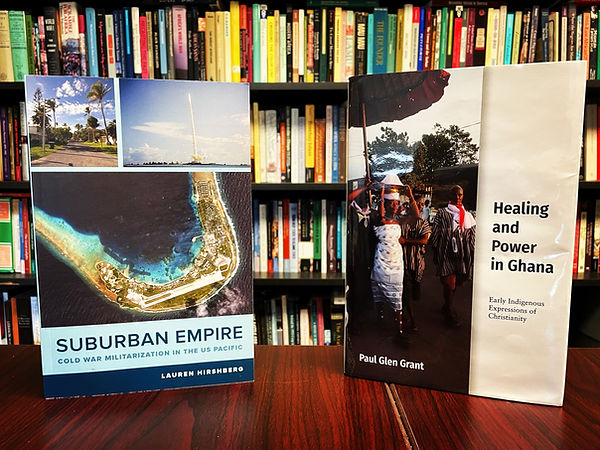
BOOK PLUG, 2022 EDITION: Lauren Hirshberg Suburban Empire: Cold War Militarization in the US Pacific (University of California Press) which looks at the fascinating ways suburbanization, militarization, and segregation played out in the tiniest American enclave out in the middle of the Pacific (in the Marshall Islands) and what this small stage tells us about the phenomenon playing out in the 20th c. US more broadly.
Paul Grant, Healing and Power in Ghana: Early Indigenous Expressions of Christianity (Baylor University Press) which looks at how the imperialist attempts to enforce ethnic, linguistic or ritual “purity” rarely prevailed against the people of southern Ghana, whose moral imagination was able to turn strangers into neighbors.
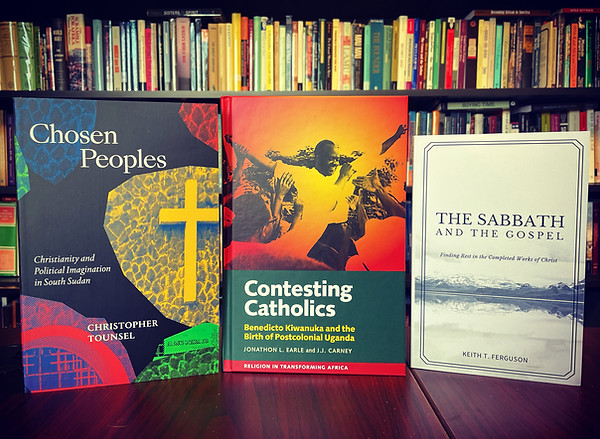
BOOK PLUG, 2021 EDITION: Last week I received 3 new books in the mail from four of my friends and colleagues. Chris Tounsel and Jon Earle are from my academic family tree—and thus our overlapping interests in religion and the political imagination in Eastern Africa. Jon teamed up with Jay Carney, a historian at a sister Jesuit institution, to produce a sophisticated biography of Benedicto Kiwanuka and the complex ways Catholic actors intersected with local and regional politics at the end of empire and the Birth of Post-Colonial Uganda. Keith Ferguson, a friend of almost two decades, has written about Christian conceptions of personal peace and rest. Cant wait to tuck in and get reading! (links below if you wanna check them out)
Chosen Peoples: Christianity and Political Imagination in South Sudan (Religious Cultures of African and African Diaspora People) https://www.amazon.com/.../ref=cm_sw_r_cp_api_glt_fabc...
Contesting Catholics: Benedicto Kiwanuka and the Birth of Postcolonial Uganda (Religion in Transforming Africa) https://www.amazon.com/.../ref=cm_sw_r_cp_api_glt_fabc...
The Sabbath and The Gospel: Finding Rest in the Completed Works of Christ https://www.amazon.com/.../ref=cm_sw_r_cp_api_glt_fabc...
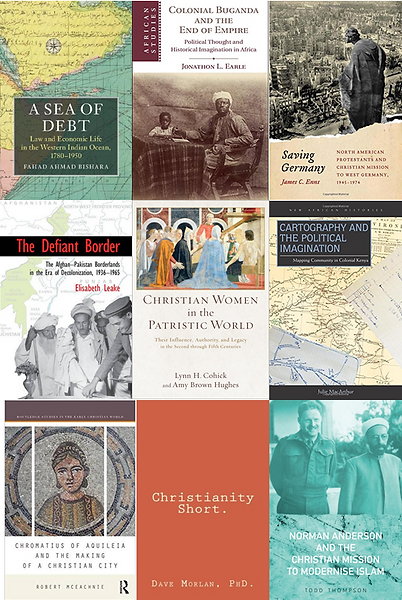
I have been blessed with great scholar friends, several of whom have recently had books published or are about to be published. Below is a list of links so that you can check out these books from my old classmates or fellow academics who I met on my own research safaris. Happy reading!
Fahad Bishara, A Sea of Debt: Law and Economic Life in the Western Indian Ocean, 1780-1950
Jonathon Earle, Colonial Buganda and the End of Empire: Political Thought and Historical Imagination in Africa
James Enns, Saving Germany: North American Protestants and Christian Mission to West Germany, 1945 -1974
Lynn Cohick and Amy Hughes, Christian Women in the Patristic World: Their Influence, Authority, and Legacy in the Second through Fifth Centuries
Elisabeth Leake, The Defiant Border: The Afghan-Pakistan Borderlands in the Era of Decolonization, 1936-65
Julie MacArthur, Cartography and the Political Imagination: Mapping Community in Colonial Kenya
Robert Mceachnie, Chromatius of Aquileia and the Making of a Christian City
Dave Morlan, Christianity Short
Todd Thompson, Norman Anderson and the Christian Mission to Modernise Islam



